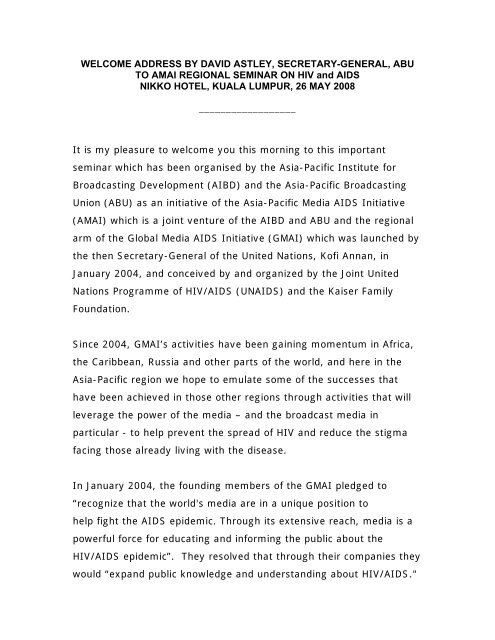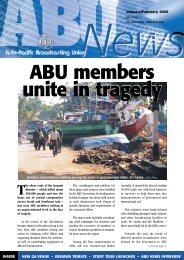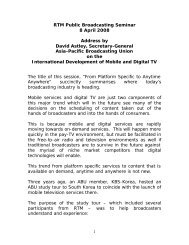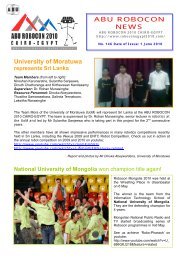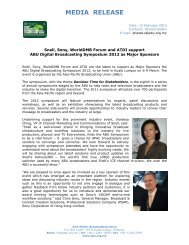WELCOME ADDRESS BY DAVID ASTLEY, SECRETARY ... - ABU
WELCOME ADDRESS BY DAVID ASTLEY, SECRETARY ... - ABU
WELCOME ADDRESS BY DAVID ASTLEY, SECRETARY ... - ABU
You also want an ePaper? Increase the reach of your titles
YUMPU automatically turns print PDFs into web optimized ePapers that Google loves.
<strong>WELCOME</strong> <strong>ADDRESS</strong> <strong>BY</strong> <strong>DAVID</strong> <strong>ASTLEY</strong>, <strong>SECRETARY</strong>-GENERAL, <strong>ABU</strong><br />
TO AMAI REGIONAL SEMINAR ON HIV and AIDS<br />
NIKKO HOTEL, KUALA LUMPUR, 26 MAY 2008<br />
__________________<br />
It is my pleasure to welcome you this morning to this important<br />
seminar which has been organised by the Asia-Pacific Institute for<br />
Broadcasting Development (AIBD) and the Asia-Pacific Broadcasting<br />
Union (<strong>ABU</strong>) as an initiative of the Asia-Pacific Media AIDS Initiative<br />
(AMAI) which is a joint venture of the AIBD and <strong>ABU</strong> and the regional<br />
arm of the Global Media AIDS Initiative (GMAI) which was launched by<br />
the then Secretary-General of the United Nations, Kofi Annan, in<br />
January 2004, and conceived by and organized by the Joint United<br />
Nations Programme of HIV/AIDS (UNAIDS) and the Kaiser Family<br />
Foundation.<br />
Since 2004, GMAI’s activities have been gaining momentum in Africa,<br />
the Caribbean, Russia and other parts of the world, and here in the<br />
Asia-Pacific region we hope to emulate some of the successes that<br />
have been achieved in those other regions through activities that will<br />
leverage the power of the media – and the broadcast media in<br />
particular - to help prevent the spread of HIV and reduce the stigma<br />
facing those already living with the disease.<br />
In January 2004, the founding members of the GMAI pledged to<br />
“recognize that the world's media are in a unique position to<br />
help fight the AIDS epidemic. Through its extensive reach, media is a<br />
powerful force for educating and informing the public about the<br />
HIV/AIDS epidemic”. They resolved that through their companies they<br />
would “expand public knowledge and understanding about HIV/AIDS."
2<br />
At a Global HIV/AIDS Creative Meeting in November 2004, Dr. Peter<br />
Piot, Executive Director of UNAIDS, said: "The creative community has<br />
the power to shape behaviours of individuals and set positive lifestyle<br />
trends for communities. This coming together of the world's best<br />
creative minds to focus on AIDS is a significant boost in the response<br />
to AIDS. Getting to the hearts and minds of people is key to stopping<br />
AIDS."<br />
And Drew E. Altman, President and CEO of the Kaiser Family<br />
Foundation, said: "Media companies usually compete and keep their<br />
best creative ideas to themselves. Today, companies across the globe<br />
are sharing experiences and ideas about how best to reach people with<br />
critical information on HIV."<br />
That is what we plan to do today – to share experiences and ideas.<br />
This seminar is the second such event organised by the AIBD and <strong>ABU</strong><br />
under the AMAI banner, and its objectives are to formulate strategies<br />
to reach out to target audiences with effective campaigns, and to lay<br />
the foundations for minimum quality standards in HIV prevention<br />
efforts through the media.<br />
As I said a few moments ago, the mission of the AMAI is to leverage<br />
the power of media to help prevent the spread of HIV and reduce the<br />
stigma facing those already living with the disease.
3<br />
But there are some other important objectives. We want to:<br />
• Create a structured framework for leveraging broadcast media<br />
resources with the goal of significantly expanding HIV/AIDSrelated<br />
broadcast programming across the Asia-Pacific region;<br />
• Increase the number of media companies in Asia-Pacific actively<br />
developing or airing HIV/AIDS-related programming;<br />
• Support exchange of best practices and rights-free<br />
programming;<br />
• Promote collaboration among media companies in hard hit<br />
regions to undertake more coordinated responses to the<br />
epidemic;<br />
• Promote the integration of HIV/AIDS-related messaging across<br />
all broadcast platforms and program formats; and,<br />
• Engage and build support among non-traditional media and<br />
other relevant sectors.<br />
It’s an enormous challenge. But the media has the power to meet that<br />
challenge.<br />
HIV/AIDS threatens the health and security of all nations, but media<br />
can play a unique role in helping to stem the spread of this disease.<br />
Through media's reach and influence, we can be a powerful force for<br />
educating the public about HIV/AIDS, thereby helping to reduce its<br />
further spread and the stigma facing those already living with<br />
HIV/AIDS.
4<br />
As broadcasters serving in the public interest, we can use our<br />
communications expertise and resources to contribute to changing the<br />
course of the pandemic and thus improve the economic well-being of<br />
all the nations in our region.<br />
I thank you for the time that you have committed today to attending<br />
this seminar, and to those of you who have traveled from abroad, I<br />
thank you for the efforts that you have made to be with us here in<br />
Kuala Lumpur.<br />
I hope you find it a though-provoking and productive day, and we look<br />
forward to working with you through the various AIBD, <strong>ABU</strong> and AMAI<br />
programmes to implement the strategies that we hope to formulate<br />
today.<br />
Thank you.


